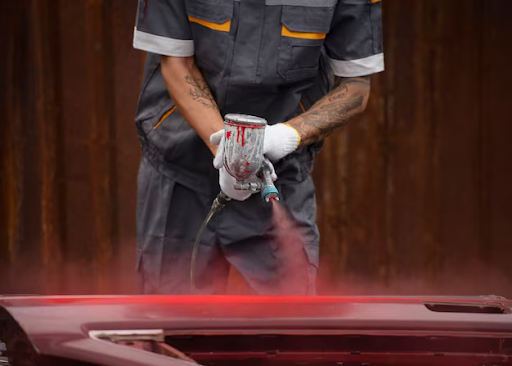Notifications
6 minutes, 32 seconds
-287 Views 0 Comments 0 Likes 0 Reviews

In the world of construction and industrial applications, both Polyurea Coating and Tile Glue play essential roles. These materials are widely used in various industries for their strength, durability, and flexibility. Polyurea coatings are known for their waterproofing and protective capabilities, while tile glue is crucial for ensuring the strong adhesion of tiles in flooring and wall applications. This blog will explore the features, benefits, and applications of polyurea coating and tile glue, shedding light on their significance in modern construction.
Polyurea coating is a high-performance elastomeric coating derived from the reaction of an isocyanate component with a resin blend component. Known for its rapid curing, flexibility, and resistance to extreme environmental conditions, polyurea coatings have gained immense popularity in various industries, including construction, automotive, marine, and manufacturing.
Exceptional Durability: Polyurea coatings provide outstanding resistance against abrasion, chemical exposure, and mechanical impact, making them ideal for industrial and commercial applications.
Waterproofing and Corrosion Resistance: This coating acts as an impermeable barrier against moisture, preventing rust and corrosion on metal surfaces.
Fast Curing and Application: Unlike traditional coatings, polyurea cures within seconds, reducing downtime and increasing efficiency in large-scale projects.
Flexibility and Crack Bridging: Polyurea coatings have high elongation properties, allowing them to accommodate structural movements and bridge cracks effectively.
UV and Temperature Resistance: These coatings perform exceptionally well in extreme temperatures and harsh weather conditions, making them suitable for both indoor and outdoor applications.
Polyurea coatings are extensively used across different industries, including:
Roof and Concrete Protection: Provides a seamless and watertight layer for concrete roofs, parking decks, and bridges.
Tank and Pipeline Coatings: Offers corrosion resistance for storage tanks, pipelines, and wastewater treatment plants.
Automotive and Marine Industry: Used in truck bed liners, boat hulls, and industrial vehicles for enhanced durability.
Industrial Flooring: Ensures high-performance flooring in warehouses, factories, and chemical plants.
Secondary Containment Systems: Prevents hazardous material leaks in chemical storage facilities.
Tile glue, also known as tile adhesive, is a specially formulated bonding agent designed to fix tiles onto various substrates such as concrete, wood, and drywall. It ensures strong adhesion, flexibility, and resistance to moisture, making it a crucial component in tile installation projects.
Tile adhesives come in different formulations, each suited for specific applications:
Cement-Based Tile Adhesive: Commonly used for ceramic and porcelain tiles, offering strong bonding on concrete and masonry surfaces.
Acrylic-Based Tile Adhesive: Pre-mixed and ready-to-use, suitable for lightweight tile applications and interior walls.
Epoxy Tile Adhesive: Highly resistant to chemicals, water, and heat, making it ideal for industrial and high-moisture environments.
Polymer-Modified Tile Adhesive: Enhanced with polymers for improved flexibility, adhesion, and crack resistance.
Superior Bonding Strength: Ensures long-lasting adhesion, preventing tile dislocation over time.
Water and Moisture Resistance: Essential for bathroom, kitchen, and outdoor tile installations.
Flexibility and Crack Prevention: Absorbs movement and minor substrate imperfections, reducing the risk of cracks.
Time-Saving and Easy Application: Pre-mixed and ready-to-use options reduce installation time and effort.
Suitable for Large Format Tiles: Helps in the secure placement of heavy and oversized tiles without sagging.
Tile glue is an indispensable material in various construction projects, including:
Residential and Commercial Flooring: Used in homes, offices, malls, and hotels for tile installation.
Wet Areas and Pools: Provides a strong bond in moisture-prone areas like bathrooms, kitchens, and swimming pools.
Exterior Cladding and Facades: Ensures secure tile attachment in outdoor architectural elements.
Underfloor Heating Systems: Works efficiently with heated floors, preventing tile displacement due to thermal expansion.
How to Choose the Right Product for Your Needs
Choosing between polyurea coating and tile glue depends on the application requirements:
If you need a high-performance protective layer for industrial surfaces, waterproofing, or corrosion resistance, polyurea coating is the best option.
If your project involves tile installation, ensuring secure adhesion and flexibility, tile glue is the ideal choice.
For wet and outdoor environments, use moisture-resistant formulations of both products.
Both Polyurea Coating and Tile Glue are essential in modern construction, offering durability, adhesion, and protection in various applications. Whether you are looking for a reliable surface coating or a strong adhesive for tiles, understanding their features and benefits will help you make an informed decision for your project.
By choosing the right materials and following proper application methods, you can enhance the longevity and efficiency of your construction or industrial projects. Whether it’s polyurea for protective coating or tile glue for seamless adhesion, these materials play a significant role in ensuring quality and durability in every application.

